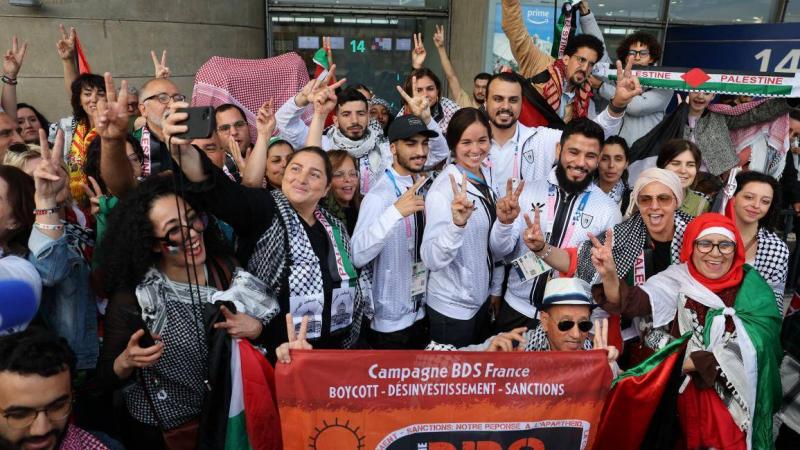The attack that France experienced on railway lines did not prevent the organizers of the Paris Olympics from continuing their work as usual. Before that, it is necessary to highlight the preparations that preceded it.
France has completed its preparations for the 2024 Olympic Games in Paris, confronting all tasks and adapting to them, using means of equipment, surveillance, and security to ensure the safety of the opening ceremony and events and the protection of the athletes. This is done in anticipation of any threats to the operations of the Games, affirming safety, fluidity, and efficiency. There is a high and maximum readiness in collaboration with joint security forces due to security and logistical concerns; about 45,000 police and gendarmerie personnel, along with 18,000 soldiers, will be deployed to secure the games, alongside British, Slovak, Moroccan, Qatari, Spanish, and South Korean units, contributing to international security forces at train stations, airports, and the vicinity of the games, under the supervision of the national coordination for Olympic security. Paris is expected to witness an amazing global event that attracts attention from all around the world, with hospitality programs and exceptional services such as accommodation, transportation, and tours. The opening ceremony will be held, for the first time in Olympic history, outside of the Olympiad stadium, by the Seine River.
The Olympic Games have always been more than just sports. Since 1896, they have been organized as a global festival sending a message to humanity in the nineteenth century. Sports reflect history and the development of societies and can be seen to be closely linked to ideal democratic values, serving as a mirror to the customs of peoples and providing an opportunity to step away from ideological confrontations. Today in France, it is more than just sporting activities; it forms part of the culture and society through the opening ceremony activities, which include musical and artistic performances, and a history of a hundred years of competitions, embodied by sporting passion with the attendance of around 120 heads of state and government from various parts of the world, 10,500 athletes, in addition to thousands of artists who will present diverse performances along the River Seine.
Enormous preparations have been announced, including in the airspace, reflecting also an exceptional security and economic impact compared to previous events. Studies indicate that the games will generate between six or seven to 11 billion euros in economic benefits for the city of Paris, with an average scenario projecting approximately 8.9 billion euros. Between three to four million visitors are expected in the city, contributing to a tourist expenditure of three billion euros. Despite the economic and social challenges that France faces, the games could generate tax revenues of up to 5.3 billion euros (four billion euros from 11,900 events), helping to offset public investments and promising many benefits while boosting local economies and promoting general tourism. This year, the number of tourists in France is expected to rise to 50 million, enhancing France's position and image globally and focusing attention more on cultural and social benefits, away from ongoing political tensions. This has not stopped rising calls for a temporary suspension of the Olympic scene, recognizing the seriousness of climate change challenges. One of the successes is the way the games have highlighted the deep impact of climate change. Tokyo in 2020 had to relocate the marathon by 800 kilometers due to the hot and humid summers, increasing pollution for participants. Strong storms also forced rescheduling of surfing events, and the winter games face more climate issues in higher mountains, affecting artificial snow patches in the 2022 Beijing Games.
The organizers of the Paris Olympics have given much thought to this issue and have established emergency plans for what to do if the city experiences a heat wave typical of the European summers, seeking to achieve a carbon footprint that is double the size of London 2016's. Nonetheless, the Paris Games will still produce over one and a half million tons of carbon in a festival attracting around 11,000 athletes, tens of thousands of coaches and officials, and over 30,000 journalists. Warnings from climate activists and UN Secretary-General Antonio Guterres have not proven effective.
The Olympic Games face the same problems as established institutions that are incongruent with changing political circumstances, leading to calls for stoppages or refusals for Israeli teams to participate. This is an occasion for the festival to send a strong signal regarding the urgent need to halt the moment of war in Gaza and Ukraine. The world could seize the opportunity to respond to the crisis of instability, necessitating a different level of political, humanitarian, and social action, and France is the ideal place to start this in managing events, with the Olympic event among them, not just building tourism, commercial, and advertising partnerships that perform significant interlinked functions. This would serve to promote a message of peace that is more transparent in the responsibility of the global sports organization (Berlin was supposed to host the Games in 1916, but World War I broke out, and the alternative host state, Helsinki, was engaged in fighting the Soviet Union in 1944).
Athletes participate in the Olympics not only to represent their countries in the best way possible but also to express their ability to say something artistically and entertainingly. We do not know what we will see in the competitions beyond running, swimming, and jumping; it serves as an opportunity to explore the spirit of the games: faster, higher, stronger, and the various forms in which the body can create and move as men and women from all over the world come together to discover new messages. Such messages are not an aside to the social objective or ethical mission in embracing the sports movement for human rights (the embrace of that movement has compromised those rights over the past two decades due to its dealings with authoritarian host states, and this summer has caused the noticeable contradiction in prohibiting Russia due to its invasion of Ukraine while preventing Israel from delivering aid to Gaza).
The new sports included in the Olympics, such as breaking (breakdance), will appear for the first time this summer in Paris, joining new urban sports such as BMX, skating, and basketball. This is part of a wide shift that includes global events aimed at youth in a game of breaking records according to standards of technique, execution, music, originality in personal style, and spontaneity, relying on a comparative judging system that allows diversity and spontaneity in sources of inspiration from arts and appeal, from Latin dance to gymnastics.
Over many years, the level of the Olympic Games has steadily increased with the growth of international competitions. The cultural implications of including some sports like breaking have recently been explored in a special issue of the Global Hip Hop Studies Journal. And who knows, perhaps tomorrow there will be pop and rap songs. From another perspective, reflecting on the games expands the understanding of the vocabulary of human body movement and liberation, for a sustainable and stable society, and for a planet suitable for life and habitation, although it is unclear how the issue of housing and accommodation was addressed in a completely closed Paris.




